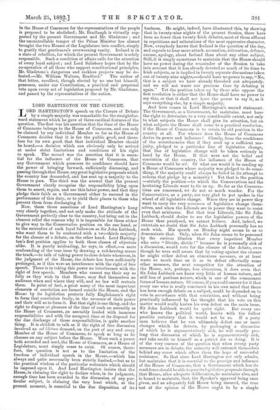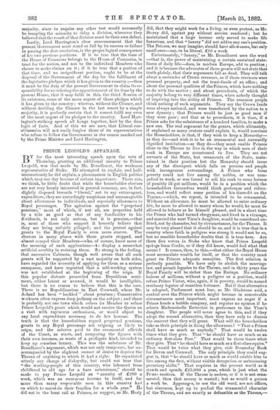LORD HARTINGTON ON THE CLOSURE.
TORD HARTINGTON'S speech on the Closure of Debate J by a simple majority was remarkable for the straightfor- ward statement which he gave of three cardinal features of the question. The first was his assertion that the time of the House of Commons belongs to the House of Commons, and can only be claimed by any individual Member so far as the House of Commons decides that it is for the public good, and there- fore for its own good, that that individual Member should be heard,—a decision which can obviously only be arrived at under strict limitations and conditions of his right to speak. The second was the assertion that it is essen- tial for the influence of the House of Commons, that any Government which possesses its confidence should have the power of bringing forward, sufficiently discussing, and passing through that House, any great legislative proposals which the country has demanded, and has sent up a majority to the House to pass. The third was the avowal that the present Government clearly recognise the responsibility lying upon them to assert, regain, and use this latter power, and that they pledge their faith as a Government either to succeed in the performance of this duty, or to yield their places to those who prevent them from discharging it.
Now, these three assertions of Lord Hartington's hang very closely together, and not only make the attitude of the Government perfectly clear to the country, but bring out in the clearest relief the reasons why it is impossible for them either to give way to the Conservative position on the one hand, or to the entreaties of such loyal followers as Sir John Lubbock, who want them to be contented with a two-thirds majority for the closure of a debate, on the other hand. Lord Harting- ton's first position applies to both these classes of objectors alike. It is purely misleading, he says, in effect,—a mere confounding of the true issue by drawing a red-herring across the track,—to talk of taking power to close debate whenever, in the judgment of the House, the debate has been sufficiently prolonged, as if this were an interference with the right of free speech. There is in taking this power no interference with the right of free speech. Members who cannot say their say as fully as they wish in that House, may find themselves an audience when and where they will, and no law will restrain them. In point of fact, a great many of the most important elements of conviction are formed outside the House, and the House by its legislation protects fully Englishmen's right to form that conviction freely, in the measure of their power and their will so to form it. But that right is one thing, and the right to dispose at pleasure of the time of such an assembly as the House of Commons, an assembly loaded with immense responsibilities and with the meagrest time at its disposal for the due discharge of those responsibilities, is quite another thing. It is childish to talk as if the right of free discussion involved an ad Ebituni demand, on the part of any and every Member of the House of Commons, to speak as long as he chooses on any subject before the House. Were such a power both accorded and used, the House of Commons, as a House of Legislature, must simply cease to exist. Of course, there- fore, the question is not as to the limitation of the freedom of individual speech in the House,—which has always and quite necessarily been strictly limited,—but as to the practical wisdom of the particular restraints which should be imposed upon it. And Lord Hartington insists that the House, in claiming the right to declare when, in its judgment, enough time has been awarded to the discussion of any par- ticular subject, is claiming the very least which, at the present moment, is essential to the due disposition of its
business. He might, indeed, have illustrated this, by showing that in twenty-nine nights of the present Session, there have been no fewer than twenty Irish debates, most of them affluent in repetitions and reiterations of the most oppressive character. Now, everybody knows that Ireland is the question of the day, and expects to hear more attack, accusation, reiteration, defence, excuse, apology, about Ireland than about any other subject. Still, it is simply monstrous to maintain that the House should have no power during the remainder of the Session to take into account that it has already devoted so much of its time to Irish subjects, as is implied in twenty separate discussions taken out of twenty-nine nights,—should have no power to say, "No, that is a subject we have already threshed out adequately, and we will not waste our precious time by debating it again." Yet the position taken up by those who oppose the first resolution is either that the House shall have no power to say this, or that it shall not have the power to say it, as it says everything else, by a simple majority.
And here comes in Lord Harlington's second statement. The Government, as a Government, he maintains, must have the right to determine' to a very considerable extent, not only to what subjects the House shall give its attention, but on what subjects the House shall come to a practical resolution, if the House of Commons is to retain its old position in the country at all. For whence does the House of Commons derive its power and influence ? Clearly, from the confidence of the constituencies that if they send up a sufficient ma- jority, pledged to a particular line of legislative change, that line of legislative change will be taken seriously in hand by the House. If that were not the belief and conviction of the country, the influence of the House of Commons would be nil. Of what use would it be sending up a House of Commons whose majority was pledged to do some- thing, if the majority could always be foiled in its attempt to redeem that pledge by a minority ? Yet that is the position —strictly the position—to which the Conservatives and the hesitating Liberals want to tie us up. So far as the Conserva- tives are concerned, we do not so much wonder. For the Conservatives, as a party, are very glad to put spokes in the wheel of all legislative change. When they are in power they want to carry the very niininuan of legislative change them- selves, and when the Liberals are in power they want to resist even that minimum. But that true Liberals, like Sir John Lubbock, should desire to see the legislative powers of the House thus paralysed, we cannot believe. And, indeed, we entertain no doubt that Sir John Lubbock personally has no such wish. His speech on Monday night seems to us to demonstrate that. Only, when Sir John seems to be possessed by the curious illusion that every impatient Member who cries "Divide, divide !" because he is personally sick of a discussion, would vote for the closure of the debate, even though he were well aware that by voting against the closure he might either defeat an obnoxious measure, or at least waste so much time on it as to defeat effectually some other measure, the next competitor for the attention of the House not, perhaps, less obnoxious it does seem that Sir John Lubbock can know very little of human nature, and still less of partisan nature, which is one of the commonest forms of human nature. Of course, if you could answer for it that every one who is really convinced in his own mind that there has been enough debate on a subject., could be depended on to vote in accordance with that conviction, and without being practically influenced by the thought that his vote on this matter would really hasten his own defeat on the main issue, Sir John Lubbock would be quite right. But every one
who knows the political world, knows with the fullest possible certainty that it would not be so. If a party man believes that he can ultimately defeat one or more changes which he detests, by prolonging a discussion of which he is argumentatively sick, he will usually pro- long that discussion of which he is argumentatively sick, and take credit to himself as a patriot for so doing. It is of the very essence of the question that when strong party measures are in debate, the minority will entrench themselves behind any cover which offers them the hope of successful resistance. So that since Lord Harlington not only admits, but maintains that it is essential to the prestige and influence of the House of Commons, that a Government which has its confidence should be able to pass its legislative proposals through that House, after adequate deliberation, he maintains also, and is bound to maintain, that, the Speaker's approval being once given, and an adequately full House being ensured, the true test of the opinion of the House ought to be a simple majority, since to require any other test would necessarily be tempting the minority to delay a division, whenever they believed that the result of that division must be their own defeat.
Lastly, Lord Hartington's clear announcement that the present Government must stand or fall by its success or failure in passing the first resolution, is the proper logical consequence of his two previous positions. If it be true that the time of the House of Commons belongs to the House of Commons, in trust for the nation, and not to the individual Members who choose to make claims on it ; if it be true that a portion of that time, and no insignificant portion, ought to be at the disposal of the Government of the day for the fulfilment of the legislative pledges which it has given to the country ;—then it must be the duty of the present Government to claim its re- sponsibility for so ordering the apportionment of its time by the present House, that it may fulfil in this, the third Session of its existence, some of the more urgent of those pledges which it has given to the country ; whereas, without the Closure, and without deciding the Closure in the last resort by a simple majority, it is perfectly certain that it cannot fulfil any even of the most urgent of its pledges to the country. Lord Hart- ington's striking speech all hangs together, knit by the firm logic of facts. And of this we are sure, that Liberal con- stituencies will not easily forgive those of its representatives who refuse to follow the Government in the course marked out by the Prime Minister and Lord Hartington.



































 Previous page
Previous page